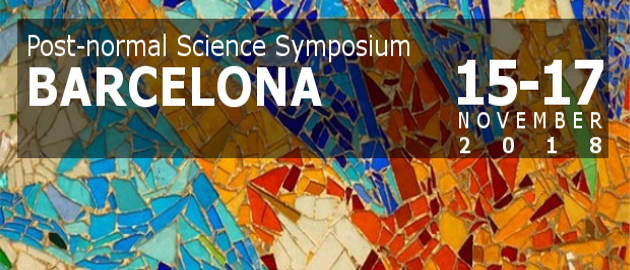
Call for contributions
Science, as it stands today, faces a crisis of public and political trust, combined with an inner erosion of standards of quality and integrity. Scientific findings are increasingly recognised as neither as reliable nor reproducible as they used to be portrayed. Beliefs in and self-declarations of the disinterestedness of scientific endeavours, separated from vested interest, political agenda or social and cultural context are recognised as empirically and philosophically problematic. Scientific elites are, for better or for worse, challenged by an erosion of trust on a par with that experienced by political elites in modern societies. Scientific institutions charged with higher education face demands of high societal relevance and impact which they do not know how to meet and how to prepare for.
This crisis on multiple fronts calls for a fundamental reform. Post-normal science(PNS) offers direction to such a reform, as a critical concept challenging mainstream practices of science, as an inspiration for new styles of research practice, and as an inspiration and support for new conventions of research quality assurance that better respond to the post-normal conditions of today's societal challenges. This multifaceted nature of PNS is both descriptive and normative. It provides a framework for describing and diagnosing urgent decision problems – post-normal issues – characterized by incomplete, uncertain or contested knowledge and high decision stakes, and critical reflection on how these characteristics change the relationship between science and governance. At the same time, PNS inspires a movement of critical resistance and reform towards a new style of scientific inquiry and practice that is reflexive, inclusive (in the sense that it seeks upstream engagement of extended peer communities) and transparent in regards to scientific uncertainty, ignorance, values and framings, and moving into a direction of democratisation of expertise.
This fourth PNS symposium [PNS1 in Bergen, NO, PNS2 in Ispra, IT (summarized in a recent special issue of Futures) and PNS3 in Tübingen, DE] provides a platform to discuss and explore the guidance that post-normal science can offer in finding a way out of the present crisis in and around science.
The meeting topics will be:
- PNS as a critical concept for informed resistance and reform (What strategies of resistance and what of reform or Reformation does PNS care about? What, when, where, why each of them? Resisting what, by/for/against whom, and why?)
- Ethics and matters of care in quantification, algorithms and big data(responsible quantification, use of quantitative evidence in policy making; post-normal perspectives on algorithms, big data, machine learning and AI)
- Tools and practices in knowledge quality assessment and extended peer communities (deliberation support tools for informed multi actor dialogues; which actors and how? Empowering marginalized actors)
- Post-normal literacy (building societal resilience to sloppy science, conspiracy theories, and post-truth phenomena; best practices for open science, quality assurance of extended facts)
- Puzzling value landscapes (responsibility, dignity, integrity, and other values)
- PNS in the making of futures (anticipation, path dependency, defending humanity)
The symposium welcomes contributions from the sciences, the humanities, and the arts as well as from the extended peer communities. We encourage applications that reflect on the constructive role of post-normal science as a critical concept and source of inspiration for reforming practices of research, quality assurance, and interfacing science and governance.
To highlight the rich diversity of experiences, we invite contributions addressed but not limited to issues of health, environment, energy, sustainability, emerging technologies, policy and politics.
The symposium is organised in the format of a few invited keynote presentations, oral presentations, Q&A panels, as well as installations:
Oral presentations will be clustered into thematic sessions based on the submissions received and the meeting topics listed above. Each session will convene the speakers for a Q&A panel at the end.
The installations can consist of posters, objects or interactive initiatives.
Dates to keep in mind
Deadlines
8th June 2018 Deadline for submission of abstracts of no more than 150 words using the submission form on the conference website. When submitting an abstract, please indicate whether the abstract is for an oral presentation (‘oral paper’) or an installation/poster.
13th August 2018 Deadline for communication to the authors of the selected contributions.
15th November 2018 9:00 AM - 17th November noon Symposium
For more information go to the event website: http://symposium.uoc.edu/17275/detail/post-normal-science-symposium-barc...